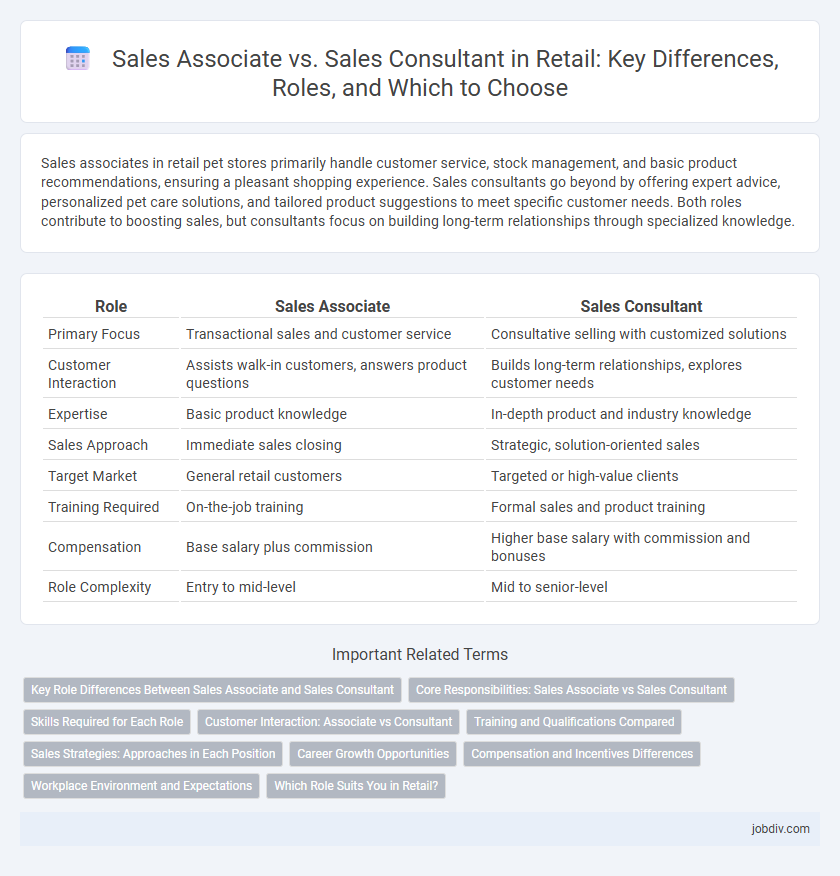Sales associates in retail pet stores primarily handle customer service, stock management, and basic product recommendations, ensuring a pleasant shopping experience. Sales consultants go beyond by offering expert advice, personalized pet care solutions, and tailored product suggestions to meet specific customer needs. Both roles contribute to boosting sales, but consultants focus on building long-term relationships through specialized knowledge.
Table of Comparison
| Role | Sales Associate | Sales Consultant |
|---|---|---|
| Primary Focus | Transactional sales and customer service | Consultative selling with customized solutions |
| Customer Interaction | Assists walk-in customers, answers product questions | Builds long-term relationships, explores customer needs |
| Expertise | Basic product knowledge | In-depth product and industry knowledge |
| Sales Approach | Immediate sales closing | Strategic, solution-oriented sales |
| Target Market | General retail customers | Targeted or high-value clients |
| Training Required | On-the-job training | Formal sales and product training |
| Compensation | Base salary plus commission | Higher base salary with commission and bonuses |
| Role Complexity | Entry to mid-level | Mid to senior-level |
Key Role Differences Between Sales Associate and Sales Consultant
Sales Associates primarily handle customer service tasks such as greeting clients, assisting with product selection, and processing transactions, ensuring a smooth in-store experience. Sales Consultants focus on offering expert advice, identifying customer needs, and providing tailored solutions, often dealing with complex or high-value products. The key role difference lies in the Sales Consultant's deeper product knowledge and consultative selling approach compared to the Sales Associate's operational and support functions.
Core Responsibilities: Sales Associate vs Sales Consultant
Sales Associates primarily focus on customer interaction, assisting with product selection, and maintaining store presentation to drive immediate sales. Sales Consultants engage in in-depth client needs analysis, offering personalized recommendations and building long-term customer relationships to enhance brand loyalty. Both roles aim to increase sales, but Sales Consultants emphasize consultative selling and tailored solutions.
Skills Required for Each Role
Sales Associates excel in communication, customer service, and basic point-of-sale system operation, ensuring effective interaction and transaction completion. Sales Consultants require advanced skills such as product expertise, consultative selling techniques, and the ability to tailor solutions to diverse customer needs. Both roles demand strong interpersonal abilities, but Sales Consultants leverage deeper industry knowledge and strategic problem-solving to drive higher-value sales.
Customer Interaction: Associate vs Consultant
Sales Associates typically engage in basic customer interactions by assisting with product selection, answering questions, and facilitating transactions, emphasizing efficiency and quick service. Sales Consultants provide deeper, personalized consultations by understanding customer needs, offering tailored recommendations, and building long-term relationships that drive customer loyalty. The consultant role focuses on expert guidance and problem-solving, creating a more value-driven shopping experience compared to the transactional approach of sales associates.
Training and Qualifications Compared
Sales Associates typically receive on-the-job training focused on basic customer service skills and product knowledge, suitable for entry-level positions. Sales Consultants often undergo more comprehensive training programs that include advanced sales techniques, product expertise, and sometimes formal certifications relevant to specialized retail sectors. While Sales Associates may require minimal qualifications, Sales Consultants usually possess higher educational credentials or professional experience to effectively address complex customer needs and drive sales strategies.
Sales Strategies: Approaches in Each Position
Sales Associates primarily focus on transactional sales strategies, emphasizing product knowledge and customer interaction to drive immediate purchases. Sales Consultants adopt consultative selling techniques, identifying customer needs through in-depth questions and offering tailored solutions to foster long-term relationships. Both roles utilize upselling and cross-selling tactics, but Consultants leverage personalized recommendations to enhance customer loyalty and repeat business.
Career Growth Opportunities
Sales Associates gain foundational skills in customer service and product knowledge, establishing a strong base for career advancement. Sales Consultants typically handle more complex client interactions and strategic sales processes, opening pathways to senior sales roles or management positions. Both roles offer growth opportunities, but Sales Consultant positions often lead to higher earnings and leadership responsibilities within retail organizations.
Compensation and Incentives Differences
Sales Associates typically receive a base hourly wage supplemented by commissions or bonuses based on individual sales performance, emphasizing entry-level compensation structures. Sales Consultants often earn higher base salaries combined with performance bonuses and profit-sharing incentives, reflecting their advanced product knowledge and client advisory roles. The compensation and incentives for Sales Consultants are geared towards long-term client relationship management, whereas Sales Associates' earnings largely depend on short-term sales targets.
Workplace Environment and Expectations
Sales Associates typically work in fast-paced retail environments where they focus on transactional tasks like stocking shelves, assisting customers with purchases, and maintaining store appearance. Sales Consultants often operate in more specialized or high-end retail settings, emphasizing personalized customer service, product expertise, and long-term client relationships. Expectations for Sales Associates center on efficiency and product knowledge, while Sales Consultants are expected to deliver tailored solutions and strategic sales advice.
Which Role Suits You in Retail?
Sales Associate roles focus on engaging customers, managing transactions, and maintaining the store environment, ideal for those who thrive in fast-paced, customer-facing settings. Sales Consultants offer specialized product knowledge and customized solutions, suited for individuals passionate about building long-term client relationships and offering expert advice. Choosing between these roles depends on your strengths in direct sales interaction versus consultative selling within retail environments.
Sales Associate vs Sales Consultant Infographic

 jobdiv.com
jobdiv.com